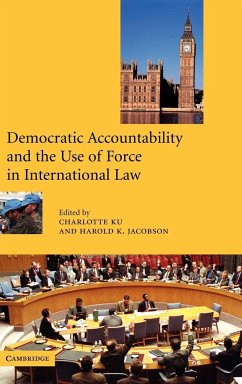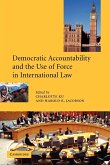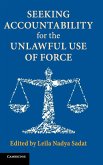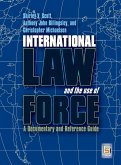Charlotte Ku / Harold K. Jacobson (eds.)
Democratic Accountability and the Use of Force in International Law
Herausgeber: Jacobson, Harold K.; Ku, Charlotte
Charlotte Ku / Harold K. Jacobson (eds.)
Democratic Accountability and the Use of Force in International Law
Herausgeber: Jacobson, Harold K.; Ku, Charlotte
- Gebundenes Buch
- Merkliste
- Auf die Merkliste
- Bewerten Bewerten
- Teilen
- Produkt teilen
- Produkterinnerung
- Produkterinnerung
An analysis of the authority of internationally-authorized armed interventions, considering experiences of nine democracies.
Andere Kunden interessierten sich auch für
![Democratic Accountability and the Use of Force in International Law Democratic Accountability and the Use of Force in International Law]() Charlotte Ku / Harold K. Jacobson (eds.)Democratic Accountability and the Use of Force in International Law52,99 €
Charlotte Ku / Harold K. Jacobson (eds.)Democratic Accountability and the Use of Force in International Law52,99 €![Seeking Accountability for the Unlawful Use of Force Seeking Accountability for the Unlawful Use of Force]() Leila Nadya SadatSeeking Accountability for the Unlawful Use of Force108,99 €
Leila Nadya SadatSeeking Accountability for the Unlawful Use of Force108,99 €![The Use of Force and International Law The Use of Force and International Law]() Christian HendersonThe Use of Force and International Law109,99 €
Christian HendersonThe Use of Force and International Law109,99 €![International Law and the Use of Force International Law and the Use of Force]() Shirley ScottInternational Law and the Use of Force141,99 €
Shirley ScottInternational Law and the Use of Force141,99 €![Necessity, Proportionality and the Use of Force by States Necessity, Proportionality and the Use of Force by States]() Judith GardamNecessity, Proportionality and the Use of Force by States145,99 €
Judith GardamNecessity, Proportionality and the Use of Force by States145,99 €![Rewriting Histories of the Use of Force Rewriting Histories of the Use of Force]() Agatha VerdeboutRewriting Histories of the Use of Force126,99 €
Agatha VerdeboutRewriting Histories of the Use of Force126,99 €![The Use of Armed Force in Occupied Territory The Use of Armed Force in Occupied Territory]() Marco LongobardoThe Use of Armed Force in Occupied Territory117,99 €
Marco LongobardoThe Use of Armed Force in Occupied Territory117,99 €-
-
-
An analysis of the authority of internationally-authorized armed interventions, considering experiences of nine democracies.
Hinweis: Dieser Artikel kann nur an eine deutsche Lieferadresse ausgeliefert werden.
Hinweis: Dieser Artikel kann nur an eine deutsche Lieferadresse ausgeliefert werden.
Produktdetails
- Produktdetails
- Verlag: Cambridge University Press
- Seitenzahl: 468
- Erscheinungstermin: 17. September 2007
- Englisch
- Abmessung: 235mm x 157mm x 32mm
- Gewicht: 905g
- ISBN-13: 9780521807470
- ISBN-10: 0521807476
- Artikelnr.: 23172736
- Herstellerkennzeichnung
- Libri GmbH
- Europaallee 1
- 36244 Bad Hersfeld
- gpsr@libri.de
- Verlag: Cambridge University Press
- Seitenzahl: 468
- Erscheinungstermin: 17. September 2007
- Englisch
- Abmessung: 235mm x 157mm x 32mm
- Gewicht: 905g
- ISBN-13: 9780521807470
- ISBN-10: 0521807476
- Artikelnr.: 23172736
- Herstellerkennzeichnung
- Libri GmbH
- Europaallee 1
- 36244 Bad Hersfeld
- gpsr@libri.de
List of figures; List of tables; Notes on contributors; Preface; List of
abbreviations; Part I. Introduction: 1. Broaching the issues Charlotte Ku
and Harold K. Jacobson; Part II. The Domestic and International Context: 2.
The interface of national constitutional systems with international law and
institutions on using military forces: changing trends in executive and
legislative powers Lori F. Damrosch; 3. Domestic political factors and
decisions to use military forces Karen A. Mingst; 4. Collective security,
peacekeeping, and ad hoc multilateralism Edwin M. Smith; 5. The legal
responsibility of military personnel Robert C. R. Siekmann; Part III.
Traditional Contributors to International Military Operations: 6. Canada:
committed contributor of ideas and forces, but with growing doubts and
problems Fen Osler Hampson; 7. Norway: political consensus and the problem
of accountability Knut G. Nustad and Henrik Thune; 8. India: democratic,
poor, internationalist Ramesh Thakur and Dipankar Banerjee; Part IV.
Newcomers to International Military Operations: 9. Japan: moderate
commitment within legal strictures Akiho Shibata; 10. Germany: ensuring
political legitimacy for the use of military forces by requiring
constitutional accountability Georg Nolte; Part V. Permanent Members of the
UN Security Council: 11. Russian Federation: the pendulum of powers and
accountability Bakhtiyar Tuzmukhamedov; 12. France: Security Council
legitimacy and executive primacy Yves Boyer, Serge Sur and Olivier
Fleurence; 13. The United Kingdom: increasing commitment requires greater
parliamentary involvement Nigel D. White; 14. The United States: democracy,
hegemony, and accountability Michael J. Glennon; Part VI. Conclusion: 15.
Towards a mixed system of democratic accountability Charlotte Ku and Harold
K. Jacobson; Appendix A: uses of military forces under the auspices of the
UN and NATO; Appendix B: country participation in international operations,
1945-2000; References; Index.
abbreviations; Part I. Introduction: 1. Broaching the issues Charlotte Ku
and Harold K. Jacobson; Part II. The Domestic and International Context: 2.
The interface of national constitutional systems with international law and
institutions on using military forces: changing trends in executive and
legislative powers Lori F. Damrosch; 3. Domestic political factors and
decisions to use military forces Karen A. Mingst; 4. Collective security,
peacekeeping, and ad hoc multilateralism Edwin M. Smith; 5. The legal
responsibility of military personnel Robert C. R. Siekmann; Part III.
Traditional Contributors to International Military Operations: 6. Canada:
committed contributor of ideas and forces, but with growing doubts and
problems Fen Osler Hampson; 7. Norway: political consensus and the problem
of accountability Knut G. Nustad and Henrik Thune; 8. India: democratic,
poor, internationalist Ramesh Thakur and Dipankar Banerjee; Part IV.
Newcomers to International Military Operations: 9. Japan: moderate
commitment within legal strictures Akiho Shibata; 10. Germany: ensuring
political legitimacy for the use of military forces by requiring
constitutional accountability Georg Nolte; Part V. Permanent Members of the
UN Security Council: 11. Russian Federation: the pendulum of powers and
accountability Bakhtiyar Tuzmukhamedov; 12. France: Security Council
legitimacy and executive primacy Yves Boyer, Serge Sur and Olivier
Fleurence; 13. The United Kingdom: increasing commitment requires greater
parliamentary involvement Nigel D. White; 14. The United States: democracy,
hegemony, and accountability Michael J. Glennon; Part VI. Conclusion: 15.
Towards a mixed system of democratic accountability Charlotte Ku and Harold
K. Jacobson; Appendix A: uses of military forces under the auspices of the
UN and NATO; Appendix B: country participation in international operations,
1945-2000; References; Index.
List of figures; List of tables; Notes on contributors; Preface; List of
abbreviations; Part I. Introduction: 1. Broaching the issues Charlotte Ku
and Harold K. Jacobson; Part II. The Domestic and International Context: 2.
The interface of national constitutional systems with international law and
institutions on using military forces: changing trends in executive and
legislative powers Lori F. Damrosch; 3. Domestic political factors and
decisions to use military forces Karen A. Mingst; 4. Collective security,
peacekeeping, and ad hoc multilateralism Edwin M. Smith; 5. The legal
responsibility of military personnel Robert C. R. Siekmann; Part III.
Traditional Contributors to International Military Operations: 6. Canada:
committed contributor of ideas and forces, but with growing doubts and
problems Fen Osler Hampson; 7. Norway: political consensus and the problem
of accountability Knut G. Nustad and Henrik Thune; 8. India: democratic,
poor, internationalist Ramesh Thakur and Dipankar Banerjee; Part IV.
Newcomers to International Military Operations: 9. Japan: moderate
commitment within legal strictures Akiho Shibata; 10. Germany: ensuring
political legitimacy for the use of military forces by requiring
constitutional accountability Georg Nolte; Part V. Permanent Members of the
UN Security Council: 11. Russian Federation: the pendulum of powers and
accountability Bakhtiyar Tuzmukhamedov; 12. France: Security Council
legitimacy and executive primacy Yves Boyer, Serge Sur and Olivier
Fleurence; 13. The United Kingdom: increasing commitment requires greater
parliamentary involvement Nigel D. White; 14. The United States: democracy,
hegemony, and accountability Michael J. Glennon; Part VI. Conclusion: 15.
Towards a mixed system of democratic accountability Charlotte Ku and Harold
K. Jacobson; Appendix A: uses of military forces under the auspices of the
UN and NATO; Appendix B: country participation in international operations,
1945-2000; References; Index.
abbreviations; Part I. Introduction: 1. Broaching the issues Charlotte Ku
and Harold K. Jacobson; Part II. The Domestic and International Context: 2.
The interface of national constitutional systems with international law and
institutions on using military forces: changing trends in executive and
legislative powers Lori F. Damrosch; 3. Domestic political factors and
decisions to use military forces Karen A. Mingst; 4. Collective security,
peacekeeping, and ad hoc multilateralism Edwin M. Smith; 5. The legal
responsibility of military personnel Robert C. R. Siekmann; Part III.
Traditional Contributors to International Military Operations: 6. Canada:
committed contributor of ideas and forces, but with growing doubts and
problems Fen Osler Hampson; 7. Norway: political consensus and the problem
of accountability Knut G. Nustad and Henrik Thune; 8. India: democratic,
poor, internationalist Ramesh Thakur and Dipankar Banerjee; Part IV.
Newcomers to International Military Operations: 9. Japan: moderate
commitment within legal strictures Akiho Shibata; 10. Germany: ensuring
political legitimacy for the use of military forces by requiring
constitutional accountability Georg Nolte; Part V. Permanent Members of the
UN Security Council: 11. Russian Federation: the pendulum of powers and
accountability Bakhtiyar Tuzmukhamedov; 12. France: Security Council
legitimacy and executive primacy Yves Boyer, Serge Sur and Olivier
Fleurence; 13. The United Kingdom: increasing commitment requires greater
parliamentary involvement Nigel D. White; 14. The United States: democracy,
hegemony, and accountability Michael J. Glennon; Part VI. Conclusion: 15.
Towards a mixed system of democratic accountability Charlotte Ku and Harold
K. Jacobson; Appendix A: uses of military forces under the auspices of the
UN and NATO; Appendix B: country participation in international operations,
1945-2000; References; Index.








